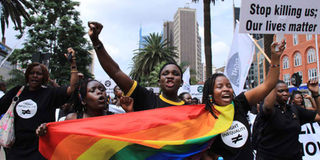Gender activists in a march dubbed Usawa demand action against GBV, youth empowerment, women land rights etc

A section of gender rights activists on Friday held a peaceful march in Nairobi to press for gender equality in the country.
The march dubbed Usawa kicked-off at Uhuru Park’s freedom corner to President’s Uhuru Kenyatta’s office at Harambee House, where they delivered a petition on gender equality.
It contained ten points memorandum of demands and proposals to the government the activists want implemented to achieve gender equality.
Among the demands include action against rampant sexual and gender-based violence, women land rights, reduced taxation on the poor, youth empowerment, increased transparency and accountability, and zero rating for rate assistance devices for person living with disabilities.
Other demands were action against extra-judicial execution and human trafficking, climate change justice, fast-tracking implementation of Mental Health Bill and broad debt rescheduling.
The march was spearheaded by Kenya Fight Inequality Alliance and the Global Fight Inequality Alliance.
Kenya Fight Inequality Alliance coordinator Ms Antonia Musunga said the more than 20 organisations came together to seek collective solutions to the causes of inequality the country faces.
The march, held in 30 other countries worldwide, was organised to coincide with Davos World Economic Forum, which tries to solve inequality in the world.
“World Economic Forum purports to solve inequality in the world while in equality, very little positive change is achieved. The current system continues to promote inequality, which damages our society and democracy, and increases vulnerability of the poor to violence, exploitation and abuse,” said Musunga.
Editar Ochieng, a feminist activist from Kibra said women still suffer with gender inequality being a problem in many communities.
“Men, women and children with disabilities are left behind because of their gender. I come from Kibra and right now we don’t get most government services. And if you’re getting the services, you overpay,” she said.
“Such inequalities is really moving us and we’re really angry. We want to change this nation.”
Anastasia Wakonyo, a paralegal at Wangu Kanja Foundation said sexual and gender-based violence was rampant, with many women not accessing help, especially in rural areas.
“We are asking the government to ensure any person who has experienced violence has access to medication, and the police, without fear. It should also ensure we know how many women, children and men are victims or violence,” said Wakonyo.
Jenny Ricks, the Global Convener of Fight Inequality said the demands for a more equal society and a sustainable world to live in, are not just happening in Kenya.
She said people in over 30 countries around the world would this week join together to put forward real solutions to inequality in their countries.
“For too long, people at the frontlines of inequality have been abused, exploited, ignored by government. The billionaire class has got richer over this time, while people have continued to suffer injustices,” she said.
She added that as the World Economic Forum meets at Davos, people around the world will demand that the billionaire class is abolished.
The march also took place in Zambia, Mexico, Chile, Hungry, UK, Philippines and India among other countries.
“Enough with listening to the billionaire class, and the rich getting richer. It’s time that people’s solutions to fighting inequality were heard,” she said.
Ten years since the promulgation of the Constitution 2010, gender equality in Kenya has remained a pipe dream despite being enshrined in the new law.
The new law was to benefit women especially, with the inclusion of the two-thirds gender rule that came to guarantee gender equality.The Gender Bill is, however, still a mirage despite three attempts to have Parliament pass it. Parliament currently has 75 women, 22 elected from the 290 constituencies in the last election; six nominated and 47 elected as woman representatives.
This means there is a requirement of 42 nominated MPs to achieve the gender principle. The scenario is no different in the public service as gender disparity rules.
The Public Service Commission (PSC) baseline survey 2013–2014, shows that the ratio of men to women in the public service stood at 70:30 with the ratio of women further reducing to 23 per cent at policy making levels.
However, a PSC policy statement on the Diversity Policy for the Public Service published in 2016, sought to rectify the anomaly by directing every public service institution to implement the two-thirds gender principle at all levels.
Despite the policy being in place, however, there is still huge gender disparity in the public service.
Gender equality remains a mirage in the private sector too. A special report released last month by Equileap that assessed 60 leading companies on workplace equality, reveals that the average score across Kenyan companies is 26 per cent.
In Africa, Rwanda is among the countries with the most gender-balanced public service with women making up half of the 26-seat Cabinet.
Today, at over 60 per cent, Rwanda has the highest percentage of women in parliament in the world. Ethiopia Prime Minister Abiy Ahmed, in 2018, named a half female cabinet in an unprecedented push for gender parity.





